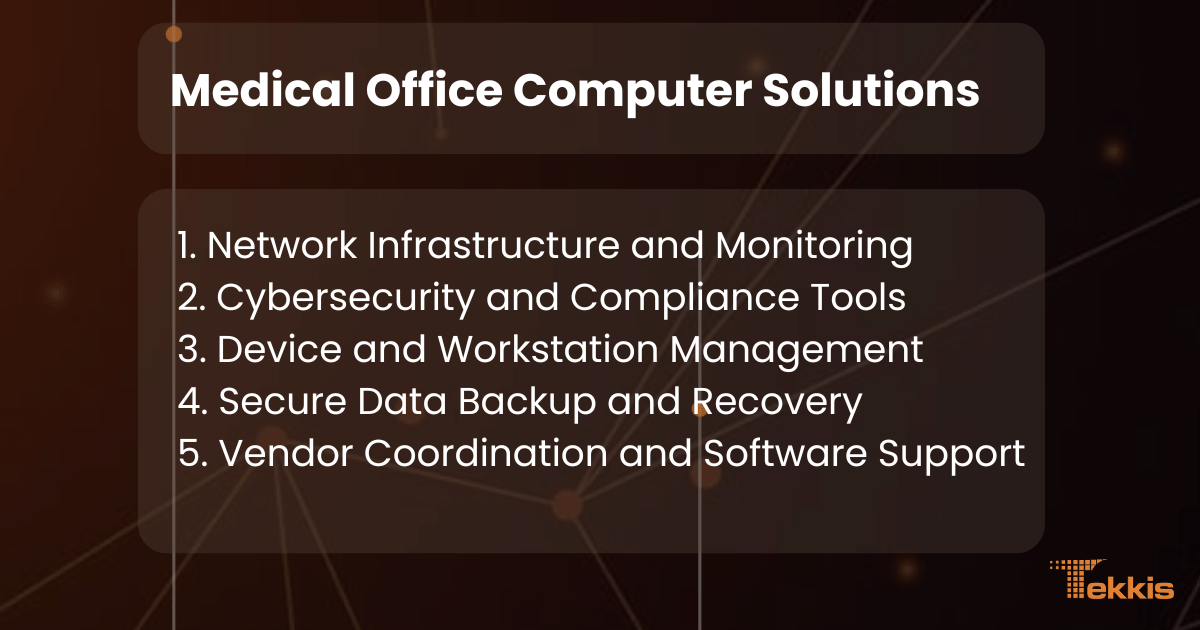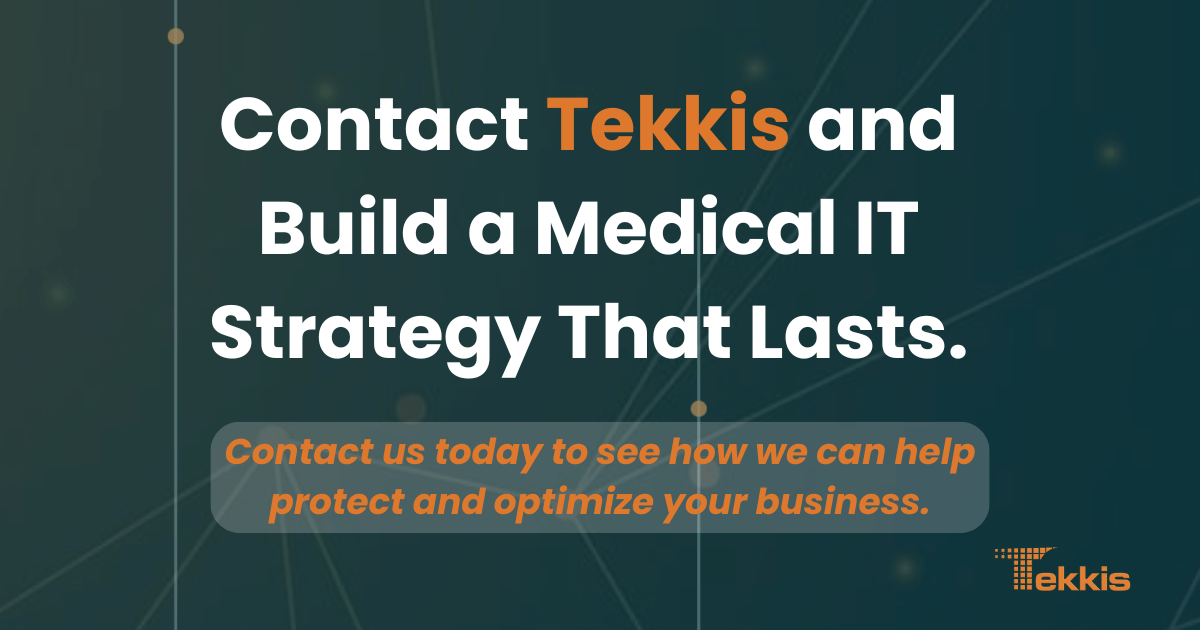Expert Medical Office Computer Solutions in Colorado: Secure, Efficient, and Local
Medical offices across Colorado face increasing pressure to maintain secure, compliant, and efficient IT systems. From digital patient records to integrated diagnostic tools, healthcare practices depend on technology to support their daily operations and meet strict regulatory requirements. Practices ranging from small clinics in Boulder to large networks in the Denver metro area often encounter unique challenges that general IT services are not equipped to handle.
This article explores what goes into specialized Medical Office Computer Solutions, why Colorado-based practices benefit from working with local providers, and how tailored support improves patient care, compliance, and operational stability. Providers like Tekkis, headquartered in Westminster, offer these solutions to medical offices across the state.
Also Read:
Why Specialized IT Solutions Matter in Healthcare Settings
Healthcare IT is more complex than traditional business technology. While any company might need data backups and cybersecurity, medical offices must also consider compliance regulations, patient privacy, and highly integrated software systems.
Key factors that make healthcare IT unique include:
- HIPAA Compliance: Medical practices must protect patient health information (PHI) according to federal standards, which requires secure data handling, encrypted communication, and thorough audit controls.
- Dependence on EMR/EHR Systems: Delays or crashes in electronic records systems can affect appointments, billing, and even clinical outcomes.
- Device and Software Integration: Offices need seamless communication between clinical tools, lab systems, and administrative platforms.
- Increased Risk of Cyberattacks: Healthcare organizations are common ransomware targets due to the high value of medical data.
A general IT provider may not fully understand the stakes or technical requirements in a clinical environment, which is why many medical offices turn to specialized support.
Local Support Advantages for Colorado Medical Offices
Working with a Colorado-based IT partner brings significant advantages, especially for healthcare environments where uptime and rapid response matter. Geographic proximity allows for faster on-site service, better alignment with local infrastructure (such as broadband options), and a stronger understanding of regional compliance practices.
Colorado's healthcare providers often span a mix of urban and rural areas, including:
- Denver
- Boulder
- Longmont
- Fort Collins
- Broomfield
- North I-70 Corridor up to the Wyoming border

Practices in these areas benefit from an IT partner who is familiar with the local tech landscape and available to provide in-person support when necessary.
What Medical Office Computer Solutions Typically Include
A strong healthcare IT strategy includes more than basic troubleshooting. Comprehensive Medical Office Computer Solutions integrate security, reliability, and efficiency to ensure clinics can function smoothly every day.
1. Network Infrastructure and Monitoring
A medical office’s network is its digital backbone. Downtime can disrupt everything from patient intake to lab results. Effective solutions include:
- High-speed, secure wired and wireless networks
- Traffic prioritization for medical systems (EMR, imaging, etc.)
- Ongoing performance monitoring and issue resolution
2. Cybersecurity and Compliance Tools
Data security is not optional in healthcare. With the average cost of a breach in healthcare reaching over $10 million, protection must be robust. Core elements of healthcare cybersecurity include:
- Data encryption (in transit and at rest)
- Endpoint protection for all devices
- Role-based access controls
- Regular vulnerability scanning and penetration testing
- Logging and audit trails for compliance verification
3. Device and Workstation Management
Front desk staff, nurses, and physicians all rely on well-maintained workstations. IT services should include:
- Routine software and operating system updates
- Antivirus and threat detection software
- Remote access support
- Replacement schedules to avoid hardware failures
4. Secure Data Backup and Recovery
System outages or data loss can be catastrophic. Healthcare IT must include:
- Encrypted cloud and local backups
- Automated, scheduled backups with daily verification
- Disaster recovery plans that include testing protocols
- Recovery time objectives (RTO) and recovery point objectives (RPO) tailored to clinic needs
5. Vendor Coordination and Software Support
Many healthcare providers use software like eClinicalWorks, Epic, Cerner, or specialty-specific EMRs. IT partners should help:
- Coordinate with software vendors for updates and troubleshooting
- Ensure smooth integration with lab and billing platforms
- Maintain compatibility across hardware and applications

Real Benefits for Colorado Healthcare Providers
When properly implemented, medical office IT solutions offer more than just technical upgrades. They contribute to better care, smoother operations, and stronger reputations.
Benefits include:
- Fewer disruptions to patient care: Reliable systems mean shorter wait times and fewer appointment cancellations.
- Increased patient trust: Patients are more likely to stay with providers who safeguard their information.
- Improved audit performance: Practices are better prepared for HIPAA and insurance audits.
- Greater staff efficiency: Employees can spend less time dealing with slow systems or tech issues.
Common Challenges in Colorado Practices and How to Solve Them
Each medical office faces its own IT pain points. Here are a few common issues across Colorado and how they’re typically addressed:
| Challenge | Example Solution |
| Poor rural internet affecting EMR use | Implementing backup 4G/5G internet failover systems |
| Staff unsure about cybersecurity protocols | Providing ongoing user training and simulated phishing tests |
| Outdated hardware slowing performance | Planning phased upgrades with lifecycle tracking |
| Uncertainty about HIPAA compliance | Conducting annual risk assessments with clear remediation steps |
What to Look for in a Healthcare IT Partner
Choosing an IT provider is a significant decision for any medical practice. Important qualities to look for include:
- Healthcare experience: Familiarity with HIPAA, EMRs, and device integration
- Local presence: Ability to offer fast, on-site support
- Proactive monitoring: Prevent issues before they become disruptions
- Transparent pricing: Flat-rate service plans and no surprise fees
- Certified staff: Team members with industry-standard certifications (Security+, CEH, etc.)

Conclusion: Technology as a Clinical Asset
For Colorado medical offices, technology is not just a back-office function it’s a critical enabler of quality care. From front-desk operations to secure patient records, strong IT systems allow healthcare teams to serve their communities efficiently and confidently.
Providers like Tekkis offer localized expertise in Medical Office Computer Solutions, supporting the full range of IT needs for healthcare practices throughout the state. Whether you're evaluating current systems or planning to expand, partnering with a knowledgeable and local team can help ensure your technology is aligned with your mission to provide excellent patient care.



